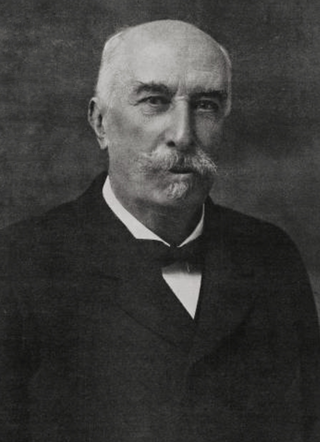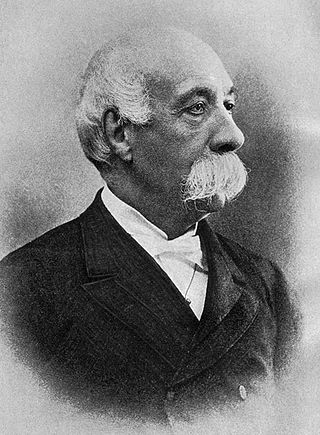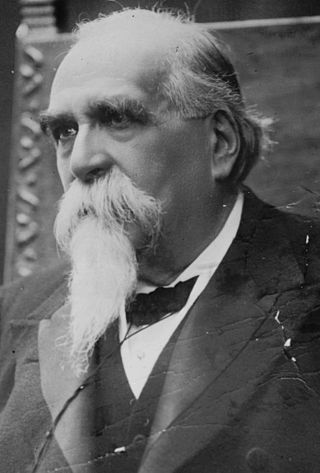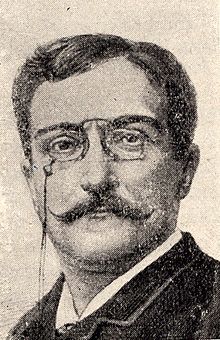
Giovanni Giolitti was an Italian statesman. He was the prime minister of Italy five times between 1892 and 1921. He is the longest-serving democratically elected prime minister in Italian history, and the second-longest serving overall after Benito Mussolini. A prominent leader of the Historical Left and the Liberal Union, he is widely considered one of the most powerful and important politicians in Italian history; due to his dominant position in Italian politics, Giolitti was accused by critics of being an authoritarian leader and a parliamentary dictator.

Giuseppe Zanardelli was an Italian jurist and political figure. He served as the Prime Minister of Italy from 15 February 1901 to 3 November 1903. An eloquent orator, he was also a Grand Master freemason. Zanardelli, representing the bourgeoisie from Lombardy, personified the classical 19th-century liberalism, committed to suffrage expansion, anticlericalism, civil liberties, free trade and laissez-faire economics. Throughout his long political career, he was among the most ardent advocates of freedom of conscience and divorce.

Francesco Crispi was an Italian patriot and statesman. He was among the main protagonists of the Risorgimento, a close friend and supporter of Giuseppe Mazzini and Giuseppe Garibaldi, and one of the architects of Italian unification in 1860. Crispi served as Prime Minister of Italy for six years, from 1887 to 1891, and again from 1893 to 1896, and was the first prime minister from Southern Italy. Crispi was internationally famous and often mentioned along with world statesmen such as Otto von Bismarck, William Ewart Gladstone, and Lord Salisbury.

Luigi Luzzatti was an Italian financier, political economist, social philosopher, and jurist. He served as the 20th prime minister of Italy between 1910 and 1911.

Agostino Depretis was an Italian statesman and politician. He served as Prime Minister of Italy for several stretches between 1876 and 1887, and was leader of the Historical Left parliamentary group for more than a decade. He is the fourth-longest serving Prime Minister in Italian history, after Benito Mussolini, Giovanni Giolitti and Silvio Berlusconi, and at the time of his death he was the longest-served. Depretis is widely considered one of the most powerful and important politicians in Italian history.

Alessandro Fortis was an Italian politician who served as the 18th prime minister of Italy from 1905 to 1906.

The Fasci Siciliani, short for Fasci Siciliani dei Lavoratori, were a popular movement of democratic and socialist inspiration that arose in Sicily in the years between 1889 and 1894. The Fasci gained the support of the poorest and most exploited classes of the island by channeling their frustration and discontent into a coherent programme based on the establishment of new rights. Consisting of a jumble of traditionalist sentiment, religiosity, and socialist consciousness, the movement reached its apex in the summer of 1893, when new conditions were presented to the landowners and mine owners of Sicily concerning the renewal of sharecropping and rental contracts.

Umberto I was King of Italy from 9 January 1878 until his assassination in 1900. His reign saw Italy's expansion into the Horn of Africa, as well as the creation of the Triple Alliance among Italy, Germany and Austria-Hungary.

The Banca Romana scandal surfaced in January 1893 in Italy over the bankruptcy of the Banca Romana, one of the six national banks authorised at the time to issue currency. The scandal was the first of many Italian corruption scandals, and discredited both ministers and parliamentarians, in particular those of the Historical Left and was comparable to the Panama Canal Scandal that was shaking France at the time, threatening the constitutional order. The crisis prompted a new banking law, tarnished the prestige of the Prime Ministers Francesco Crispi and Giovanni Giolitti and prompted the collapse of the latter's government in November 1893. The scandal led also to the creation of one central bank, the Bank of Italy.
General elections were held in Italy on 23 November 1890, with a second round of voting on 30 November. The "ministerial" left-wing bloc emerged as the largest in Parliament, winning 401 of the 508 seats. As in 1886, the elections were held using small multi-member constituencies with between two and five seats.
General elections were held in Italy on 6 November 1892, with a second round of voting on 13 November. The "ministerial" left-wing bloc emerged as the largest in Parliament, winning 323 of the 508 seats. The electoral system reverted to the pre-1882 method of using single-member constituencies with second round run-offs.
General elections were held in Italy on 26 May 1895, with a second round of voting on 2 June. The "ministerial" left-wing bloc remained the largest in Parliament, winning 334 of the 508 seats.
Events from the year 1893 in Italy.
Events from the year 1892 in Italy.
Events from the year 1894 in Italy.
Events from the year 1895 in Italy.
The Left group, later called Historical Left by historians to distinguish it from the left-wing groups of the 20th century, was a liberal and reformist parliamentary group in Italy during the second half of the 19th century. The members of the Left were also known as Democrats or Ministerials. The Left was the dominant political group in the Kingdom of Italy from the 1870s until its dissolution in the early 1910s.
Events from the year 1901 in Italy.
Events from the year 1889 in Italy

Vincenzo Calenda, baron of Tavani was an judge in the Kingdom of the Two Sicilies and the Kingdom of Italy. He was also a senator of the Kingdom of Italy and Minister of Justice in the third and fourth Crispi governments.










